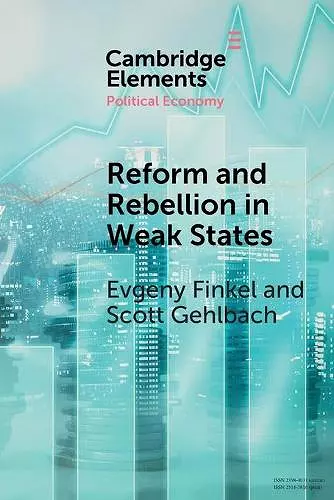Reform and Rebellion in Weak States
Evgeny Finkel author Scott Gehlbach author
Format:Paperback
Publisher:Cambridge University Press
Published:11th Jun '20
Currently unavailable, and unfortunately no date known when it will be back

Drawing on economic theory and several historical cases, this Element explains why reforms in weak states frequently provoke rebellion.
When do reforms provoke rather than prevent rebellion? This short work, written for political scientists, economists, historians, and sociologists, develops a theory of reform and rebellion. It explores that theory in the context of nineteenth-century Russia, the late Ottoman Empire, ancient Rome, the French Revolution, and contemporary Latin America.Throughout history, reform has provoked rebellion - not just by the losers from reform, but also among its intended beneficiaries. Finkel and Gehlbach emphasize that, especially in weak states, reform often must be implemented by local actors with a stake in the status quo. In this setting, the promise of reform represents an implicit contract against which subsequent implementation is measured: when implementation falls short of this promise, citizens are aggrieved and more likely to rebel. Finkel and Gehlbach explore this argument in the context of Russia's emancipation of the serfs in 1861 - a fundamental reform of Russian state and society that paradoxically encouraged unrest among the peasants who were its prime beneficiaries. They further examine the empirical reach of their theory through narrative analyses of the Tanzimat reforms of the nineteenth-century Ottoman Empire, land reform in ancient Rome, the abolition of feudalism during the French Revolution, and land reform in contemporary Latin America.
ISBN: 9781108796477
Dimensions: 227mm x 153mm x 5mm
Weight: 140g
82 pages